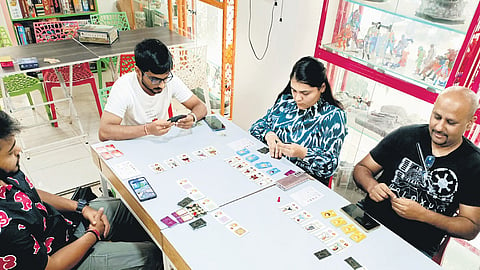

As election fever grips the nation, it is time for a new political game, played for lower stakes perhaps, but not less arresting. Designed by Siddhant Chand, 37, a board game designer from Mumbai, and Manthan Anand, 26, a political strategist from Delhi, ‘Kursi’, a political strategy card game, is set to be launched right before the 18th Lok Sabha elections.
Though played at leisure across civilisations and eras, board games require heavy-duty strategising; they are not merely games of luck. They involve planning and at times, pivoting. Whether it is the royal game of Ur from ancient Mesopotamia, Mahjong of the Qing dynasty, or Pachisi, mentioned in the Mahabharata as Pasha, and avidly played by the Mughals, these games have endured.
“I never thought I would get into designing board games,” says Anand, who approached Chand on LinkedIn last February with the idea of developing a board game based on politics. “I knew Siddhant from his previous work, especially Chai Garam (a game based on how to push your product, tea, in a mela), so I approached him on LinkedIn with the idea of developing a political game. And here we are today,” Anand says.
Delhi politics
Anand grew up in Delhi and studied at the University of Delhi. “Delhi, being the epicentre of politics, and the North Campus (of DU) being a politically active campus, I was always aware of political shifts and changes,” he says. However, being a politically aware student and being a student who is active in politics is not the same things. In 2016, Mani Shankar Aiyar, a former member of parliament visited his alma mater, St Stephen’s College. “When he walked into the cafeteria, I asked him if we (he and his friends) could sit and chat with him. We discussed some very important issues, one of which was the involvement of youth in politics,” he says.
His interaction with political figures such as MP Shashi Tharoor and MLA Sachin Pilot also broadened Anand’s political understanding. “Through these interactions, I realised that even though there will always be a first-time voter, and there are people who always vote, their involvement after the elections is next to nothing and their overall understanding of politics is not nuanced,” he says. This thought, says Anand, stayed with him as he went on to become a ministerial advisor to the Delhi government after seven years; at present, he works as an advisor to Kailash Gahlot, Delhi’s transport minister.
Chess in a deck of cards
As Chand’s company, Zenwood, is good at inventing games based on novel concepts, Anand got in touch with him with the idea of developing a game for the youth that would make politics interesting for them. “The tagline is ‘every vote counts’, and this is what we try to convey to the people who play our game. When you play this game, you’ll realise that just one vote can turn the game upside down,” says Chand.
In this two-to-four-player game, each player selects five candidates to compete for five available seats. Each seat has specific criteria, which must align with a candidate’s attributes for them to win that seat. Candidates must choose ‘icon cards’ representing various campaign issues and play them to match the criteria of the seat they are targetting. As the game unfolds, players collect different icon cards. Playing the right card at the right moment earns points, which are tallied in the end as votes. The winner is determined by the number of relevant issues a player addresses successfully.
“The moment you begin the game, you will know that winning all five seats is not possible, and this is where strategising comes into play. You must weigh which seats you have chances of winning and go for them,” says Chand. “It is like a chess game, but in cards, where you have to strategically plan your move and use your pawns for a big win.”
Players’ review
Yukti Pal, 35, a Mumbai-based marketer, who has tested the game, says, “It is easy to follow, and it shows various aspects that go into campaigning.”
“How you campaign, based on the cards you play, is very crucial because it is here where you can either earn or lose your points. These points influence your votes. This is where you can clearly understand how important just one vote is,” says Siddharth Manickasundaram, 38, a freelance writer from Chennai.
“Everybody is vying for the same seat and trying to manipulate the competition,” says Pune-based data scientist Piyush Athawale, 41. John Kingsley, 39, a Chennai-based cybersecurity engineer seconds this. “Backstabbing is a useful skill,” he says with a grin. Play testers find that the game’s replay value comes from realising, after the initial round, that their chosen strategy failed, or that another strategy might be more effective.
What’s next?
Board games today are also used as a medium of training in business schools, as they teach students the art of strategising. Tycoon, a business strategy board game by Chand, is also being studied as a case study at Gurugram’s Management Development Institute, his alma mater. The duo are also in talks with different policy and business schools across the US and India to incorporate Kursi in their syllabi. “The game is not just about the election, but what is a better time than the upcoming election to launch this game?” says Anand.